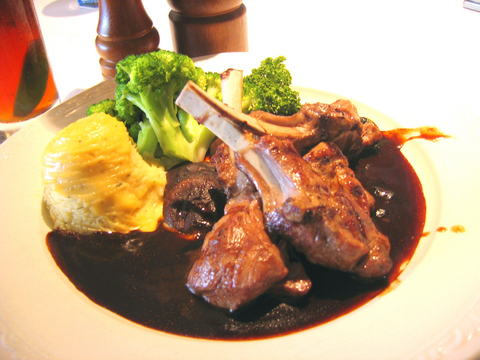Capone's is hardly the new kid on the block when it comes to fine wining and dining. The joint has, however, been through some rough times over the past six years due to bad management, ill conceived menus and interior designs.
The once popular venue could well be on the verge of making a welcome return to the big league in the coming months, however, as its irrepressible new owner Michel Blanc -- who gave Taipei its first genuine sports bar, The Tavern nearly half a decade ago -- has lofty plans for Capone's.
His first job as the new proprietor may be considered draconian by some, but Blanc's sacking of Capone's tardy ball staff has enabled him to fill the void with a crew of his own choosing, and the kitchen staff have been trained by Blanc's trusty Tavern cooks. Result? Instant improvement.

PHOTO: GAVIN PHIPPS, TAIPEI TIMES
While Blanc is, as he puts it "still experimenting with menus and so on" Capone's is open for business and is doing well. He hasn't changed the interior design, but he has revamped the daily band schedule and added several popular draft ales, which means the new Capone's caters to both those looking to enjoy a slap up meal as well those who've just left the office and fancy a swift pint or two.
Drop in on any given lunch time and there's hardly an empty table in the house and should you wish to wine and dine on Fridays and Saturdays, then reservations are now a must.
The a la carte menu is not as extensive as many other Western-style eateries, but is solid enough and filled with enough variations to placate the hungry and to keep regular punters coming back for more.
Some of the joint's top dishes include the pan-fried king prawn (NT$680), roasted lamb chops (NT$690) and the Capone's fillet (NT$650). There's also a reasonable range of pasta dishes which are available in both individual and party sizes and range in price from NT$310 to NT$695.
Although Blanc has yet to finalize any change to the interior design he remains adamant that Capone's will not become yet another sports bar.
"Capone's is a restaurant where people can enjoy fine food and fine wine," he said. "And I've got all the bloody TVs I want at the Tavern. I don't want any here!"

This month the government ordered a one-year block of Xiaohongshu (小紅書) or Rednote, a Chinese social media platform with more than 3 million users in Taiwan. The government pointed to widespread fraud activity on the platform, along with cybersecurity failures. Officials said that they had reached out to the company and asked it to change. However, they received no response. The pro-China parties, the Chinese Nationalist Party (KMT) and Taiwan People’s Party (TPP), immediately swung into action, denouncing the ban as an attack on free speech. This “free speech” claim was then echoed by the People’s Republic of China (PRC),

Exceptions to the rule are sometimes revealing. For a brief few years, there was an emerging ideological split between the Democratic Progressive Party (DPP) and Chinese Nationalist Party (KMT) that appeared to be pushing the DPP in a direction that would be considered more liberal, and the KMT more conservative. In the previous column, “The KMT-DPP’s bureaucrat-led developmental state” (Dec. 11, page 12), we examined how Taiwan’s democratic system developed, and how both the two main parties largely accepted a similar consensus on how Taiwan should be run domestically and did not split along the left-right lines more familiar in

Specialty sandwiches loaded with the contents of an entire charcuterie board, overflowing with sauces, creams and all manner of creative add-ons, is perhaps one of the biggest global food trends of this year. From London to New York, lines form down the block for mortadella, burrata, pistachio and more stuffed between slices of fresh sourdough, rye or focaccia. To try the trend in Taipei, Munchies Mafia is for sure the spot — could this be the best sandwich in town? Carlos from Spain and Sergio from Mexico opened this spot just seven months ago. The two met working in the

Many people in Taiwan first learned about universal basic income (UBI) — the idea that the government should provide regular, no-strings-attached payments to each citizen — in 2019. While seeking the Democratic nomination for the 2020 US presidential election, Andrew Yang, a politician of Taiwanese descent, said that, if elected, he’d institute a UBI of US$1,000 per month to “get the economic boot off of people’s throats, allowing them to lift their heads up, breathe, and get excited for the future.” His campaign petered out, but the concept of UBI hasn’t gone away. Throughout the industrialized world, there are fears that